Worms or internal parasites are a recurring problem in cats and kittens in India. The cases of severe worm infestations in kittens and cats can cause serious health complications, such as chronic anaemia, digestion problems, chronic diarrhoea, vomiting, bloody diarrhorea, immunity-related issues and bleeding in the GI tract. That makes deworming your cat or kitten on time a necessity for their health, whether they are indoor cats, or indoor-outdoor cats.
Deworming your cat as per schedule can help control the different types of worm population in your cat. It will also reduce the risks of the transmission of worms between cats in a multi-cat household. Deworming is cost-effective preventive healthcare that contributes to a pet’s good health and long life.
Here’s everything you need to know about worms in kittens and cats including how they get worms, the types of worms, if humans can get worms from cats, signs of worms in cats and how to reduce worms in cats.
How can your kitten get worms?
Worms are very common in kittens irrespective of their age and breed.
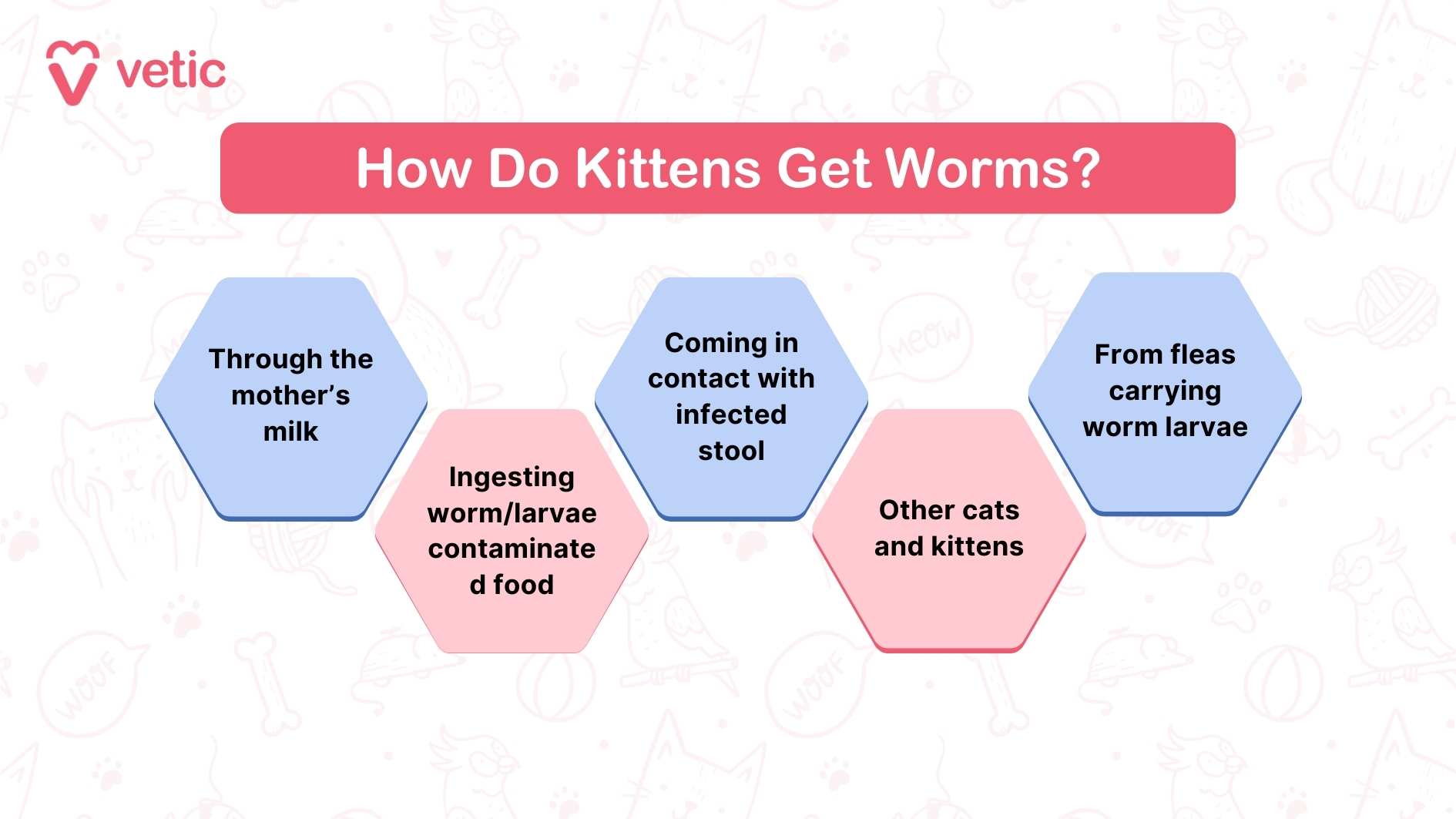
Kittens can get worms in various ways, including –
- Their mother (through the mother’s milk)
- Ingesting worm/larvae contaminated food
- Coming in contact with infected stool of other cats
- Other cats and kittens in a multi-cat household
- From fleas carrying worm larvae
Keeping your kitten’s living environment clean, deworming their mother and other cats on time, cleaning out the litter boxes regularly and keeping the cats in your house free from fleas can minimise the risk of gastrointestinal parasites (worms) in your kitten.
How can your cat get worms?
Your cat can get worms easily if they follow an outdoor or indoor-outdoor lifestyle.
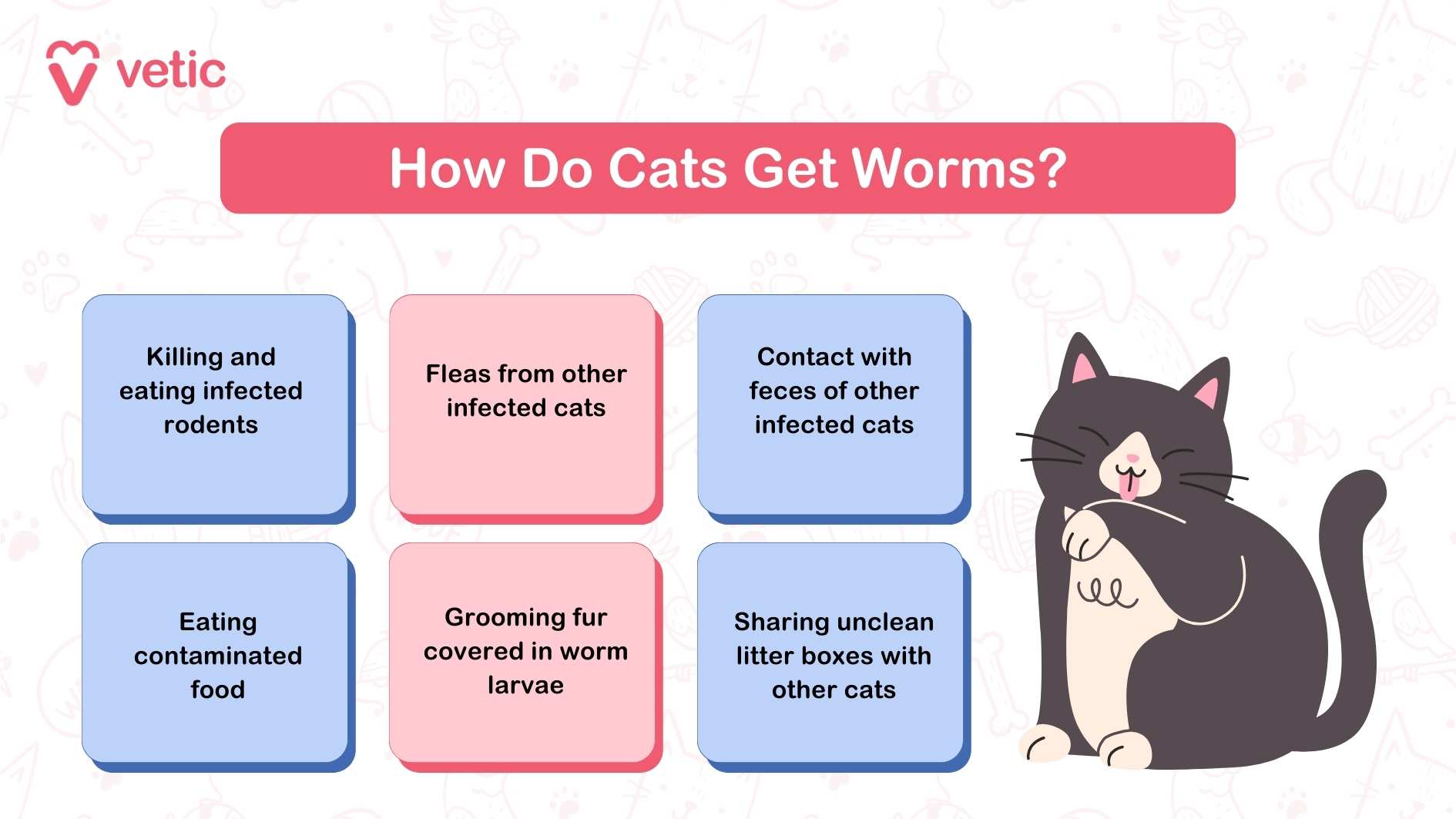
Adult cats often get gastrointestinal worms from –
- Killing and eating infected rodents
- Fleas from other cats
- Coming in touch with faeces of other infected cats
- Eating contaminated food
- Stepping on soil containing worm larvae or eggs, then grooming themselves
- Shared litter boxes that aren’t cleaned properly
If you have an outdoor or indoor-outdoor cat do your part to keep them healthy. You cannot stop your cat from hunting other small animals or stepping on infected soil, but you can keep them free from fleas and administer dewormers on time.
Can your cat get worms from your dog?
It is entirely possible for your cat to catch worms from any dog. Not all types of worms are niche to cats. At least two types of worms – roundworm (T. leonina) and hookworm (A. braziliense) can infect both cats and dogs.
What are the common types of worms in a cat’s digestive system?
Cats can be host to several types of worms throughout their lives. Some of the most common types of gastrointestinal parasites in cats include –
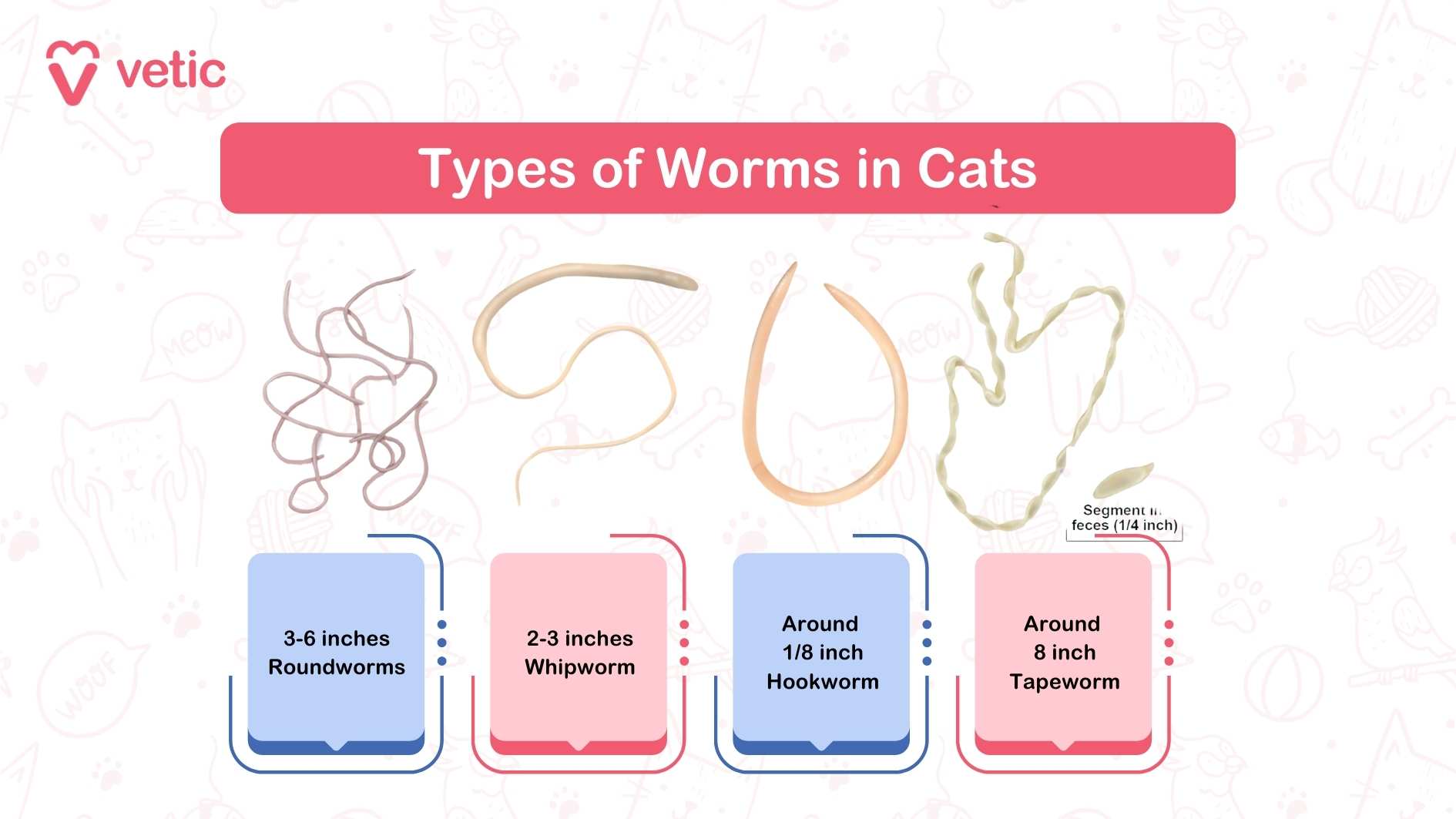
Roundworms (2 types: Toxocara leonina and Toxocara cati)
Almost all kittens have roundworms since birth or early kittenhood. The worm larvae can pass through the placenta and mother’s milk.
Hookworms
Hookworms enter the cat’s system through their skin while coming into contact with the larvae or direct ingestion. They are very tiny and not visible in the cat’s poop.
Tapeworms
Tapeworms are common too. Since the adult tapeworm sheds mature sections of their segmented body that contain more larvae. Kittens can easily ingest that while grooming themselves or their siblings.
Whipworms
Whipworms in cats are far less common but they cause digestive problems like diarrhoea in the cat.
Why deworm your cat: You can get worms from your cat?
Yes! It is possible for humans to get some worms from their cats. Although, it is not as common in adults who practise good hygiene.
Common cat worms (gastrointestinal parasites) in India –
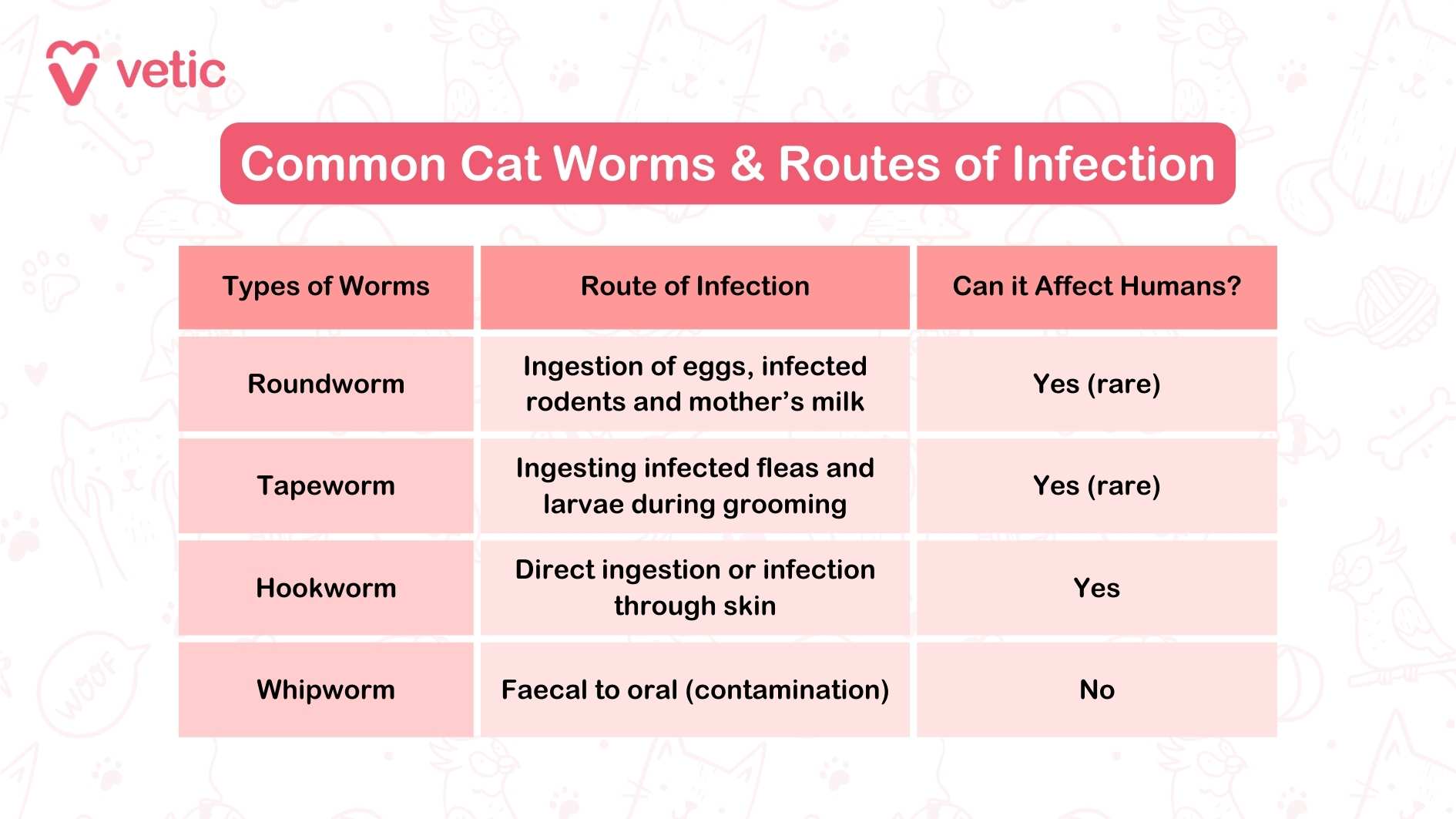
You can get roundworms, whipworms and tapeworms from your cat, but that shouldn’t happen if you have the habit of washing your hands after handling the litter box or litter scoopers.
Here are a few points to keep in mind if you have one or more cats –
- Always wash your hands after handling the litter tray and scoopers, or anything that goes near cat poo.
- Do not garden without gloves.
- Do not walk barefoot on garden soil.
- Wash your feet every time you come from the garden or porch (if barefoot)
- Eat food from freshly cleaned plates and bowls
- Keep drinking water covered and always in clean bottles
Nonetheless, when living in a tropical country like India, one can never be too sure!
It is common for all children and adults to have some worms. You should speak to your doctor about effective deworming (especially if you have children) medicines if you handle cats and dogs.
Deworming your cat: What are the signs of worms in cats?
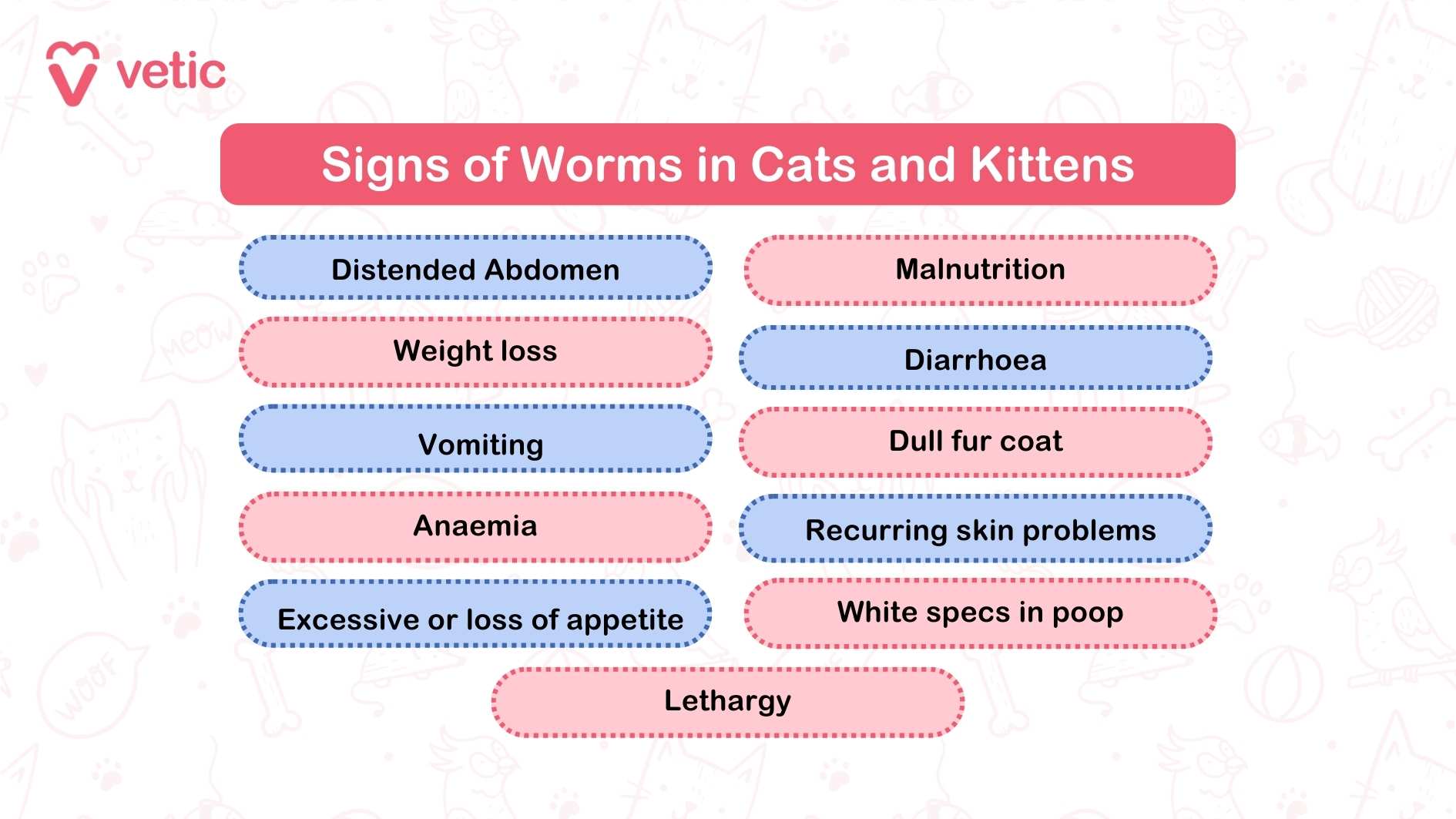
Sometimes, it is quite easy to tell if a kitten or cat has worms. Do you also want to know if your cat has worms? Look for the following signs –
- Larger than usual abdomen
- Weight loss
- Vomiting
- Diarrhoea
- Dull coat
- Skin issues including rashes
- Lethargy
- White specs in poop
- Anaemia
- Malnutrition
- Excessive appetite or loss of appetite
Not all signs are present at the same time in a cat or kitten. Your cat may show fewer subtle signs like dullness of skin and coat, pale gums and increased appetite.
Do not ignore signs of worms in cats. Always consult a veterinarian near you about deworming and worm control in the future.
Is there a way to diagnose worms in cats?
How can you know for sure that your cat has worms? Let’s find out –
- Sometimes, cats will pass worms with their stool.
- You may even find small white particles stuck around their anus.
- They may scoot on the floor, carpet or bed.
However, the only way to confirm worm infestation and the type of worms in your cat is through faecal examination.
You can talk to your veterinarian about your suspicions. They will recommend the collection and examination of your cat’s stool sample. The diagnosis takes less than 24-hours and you should opt for a clinic with in-house diagnostics for rapid diagnosis and treatment.
Our veterinary team at the Vetic Pet Clinic has helped hundreds of kittens and cats recover from worm infestations as well as worm related toxicosis. Speak to our veterinary team to learn about preventive healthcare, including how to deworm your kitten and the correct quantity of deworming medication given to cats and kittens.
Why is it a must to deworm your cat or kitten?
Worms are parasitic. That means they derive nutrition from your cat’s food.
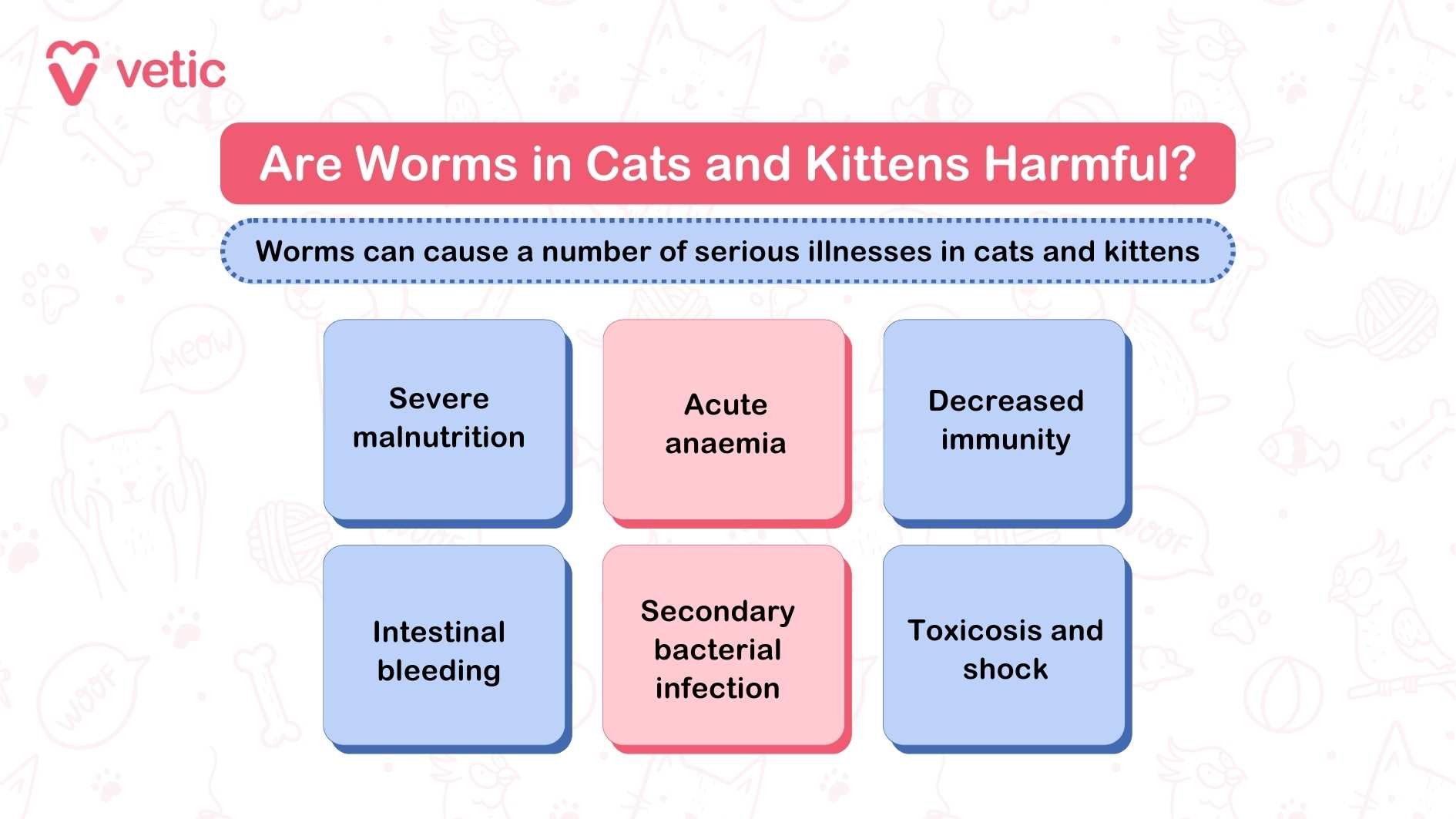
Hookworms attach themselves to your cat’s intestinal tract and feed on your kitty’s blood.
Tapeworms can travel from the GI tract and harm other organs.
Worms can cause a number of serious conditions in kittens and cats, such as –
- Severe malnutrition
- Acute anaemia
- Decreased immunity
- Haemorrhaging of the GI tract
- Secondary bacterial infections
- Toxicosis
- Shock
Worms may seem like benign nuisances but they can cause multiple health complications. Always deworm and de-flea your kitten and/or cat to prevent a heavy worm load.
What’s the best way to deworm your cats?
The choice of worm medication for your cat will depend upon their age, health and body weight. For example, kittens are typically given oral liquids for worm treatment, whereas adult cats can receive oral tablets, liquids, spot-on treatments or a combination of them. Always ask your veterinarian before deworming your cat for the first time or changing their worm medication.
Kittens are given fenbendazole or a combination of pyrantel pamoate and febantel. Whereas, adult cats can receive a combined dose of praziquantel and pyrantel embonate or pyrantel pamoate. Kittens older than 8 weeks can be given selamectin (6%) topically, as per their bodyweight, for worm control. If your cat is pregnant or lactating, you should consult a veterinarian before giving them any worm medication.
Oral dewormers can kill worms in cats
The most common way to kill and remove worms from your cat’s GI tract is by administering wormers (dewormers). Dewormers for adult cats are mostly combinations of multiple drugs that target more than one type of worm.
If you have tiny kitten(s) they may benefit from specially formulated deworming solutions for kittens.
However, most dewormers need to be administered as per your cat’s age and body weight.
At the same time, your cat’s current health condition will determine if they are fit for taking dewormers. For example – if your cat is having diarrhoea or vomiting, they should not be dewormed right away.
Broad spectrum spot-on treatments for cats
Other ways to control GI parasite populations in cats include broad spectrum spot-on treatments. These are especially useful for cats who absolutely hate taking oral medication. Spot-on treatments are non-invasive and you can easily apply them on outdoor cats as well.
Keep in mind, spot-on treatments for cats have multiple variants and only a few are useful in killing intestinal parasites.
So, speak to your veterinarian about the best way to deworm your cat or kitten. Most cats aren’t cooperative when taking medication, and you may need professional help. You can book a deworming appointment with our veterinarians who can help you give the correct dose of dewormer to your cat.
What is the correct deworming schedule for kittens?
Your veterinarian is the best person to recommend a deworming schedule for your kitten. A vet’s advice is always necessary since every kitten can have different health conditions and requirements.
The standard kitten deworming schedule that is typically followed by veterinarians is –
Every two weeks from 3 weeks until 3 months of age.
Then, every month until they are 6 months old and every 3 months thereafter.
printable deworming and vaccination chart for kittens –
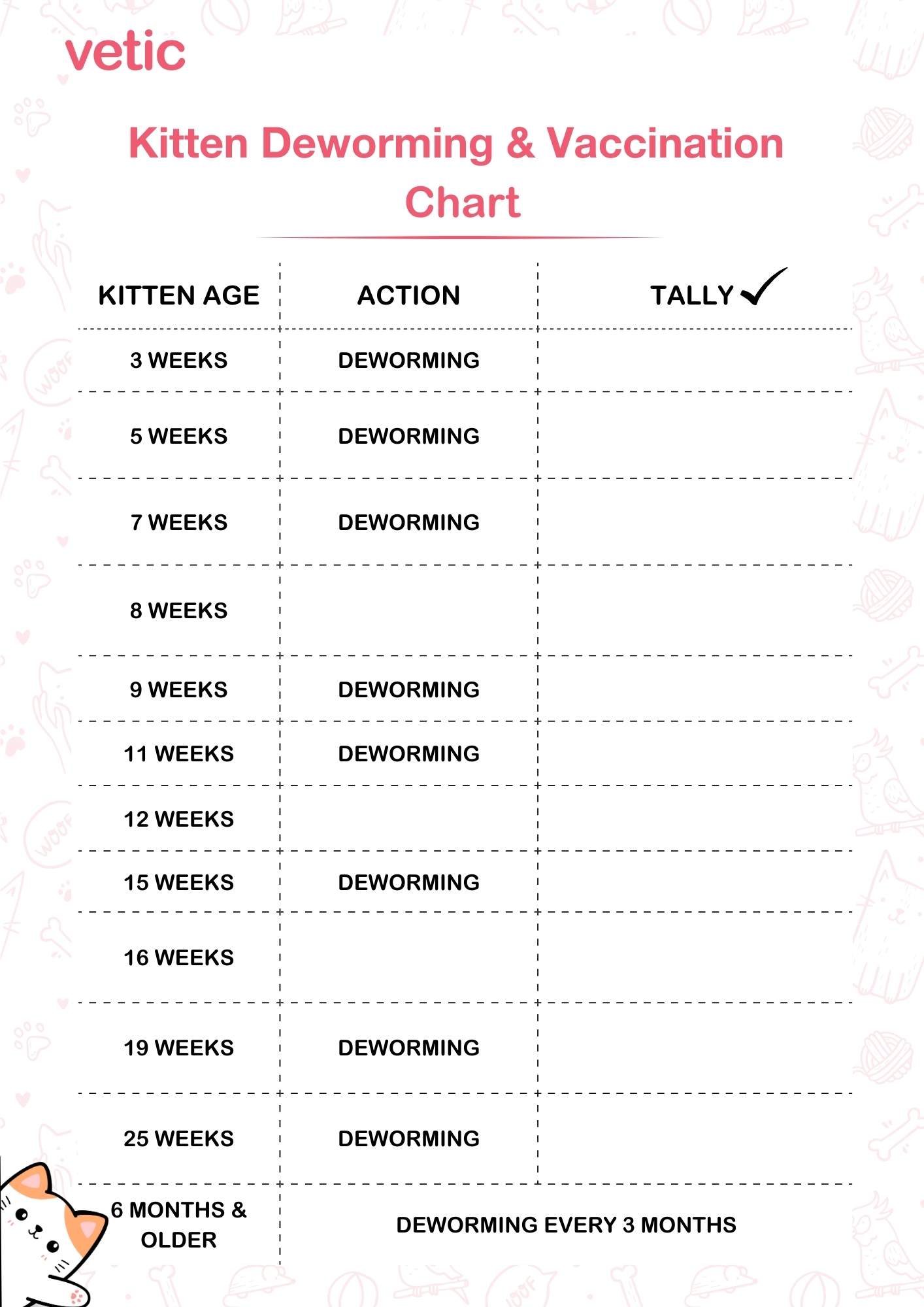
What is the correct deworming schedule for your cat?
The right way would be as per your veterinarian’s recommendation. Sick cats and very old cats may need special dewormers.
The standard way to deworm an adult cat is at a gap of every 3 months.
Your cat should always be dewormed before their yearly vaccination or any surgery!
After deworming your cat: can you prevent worms in your cat in the future?
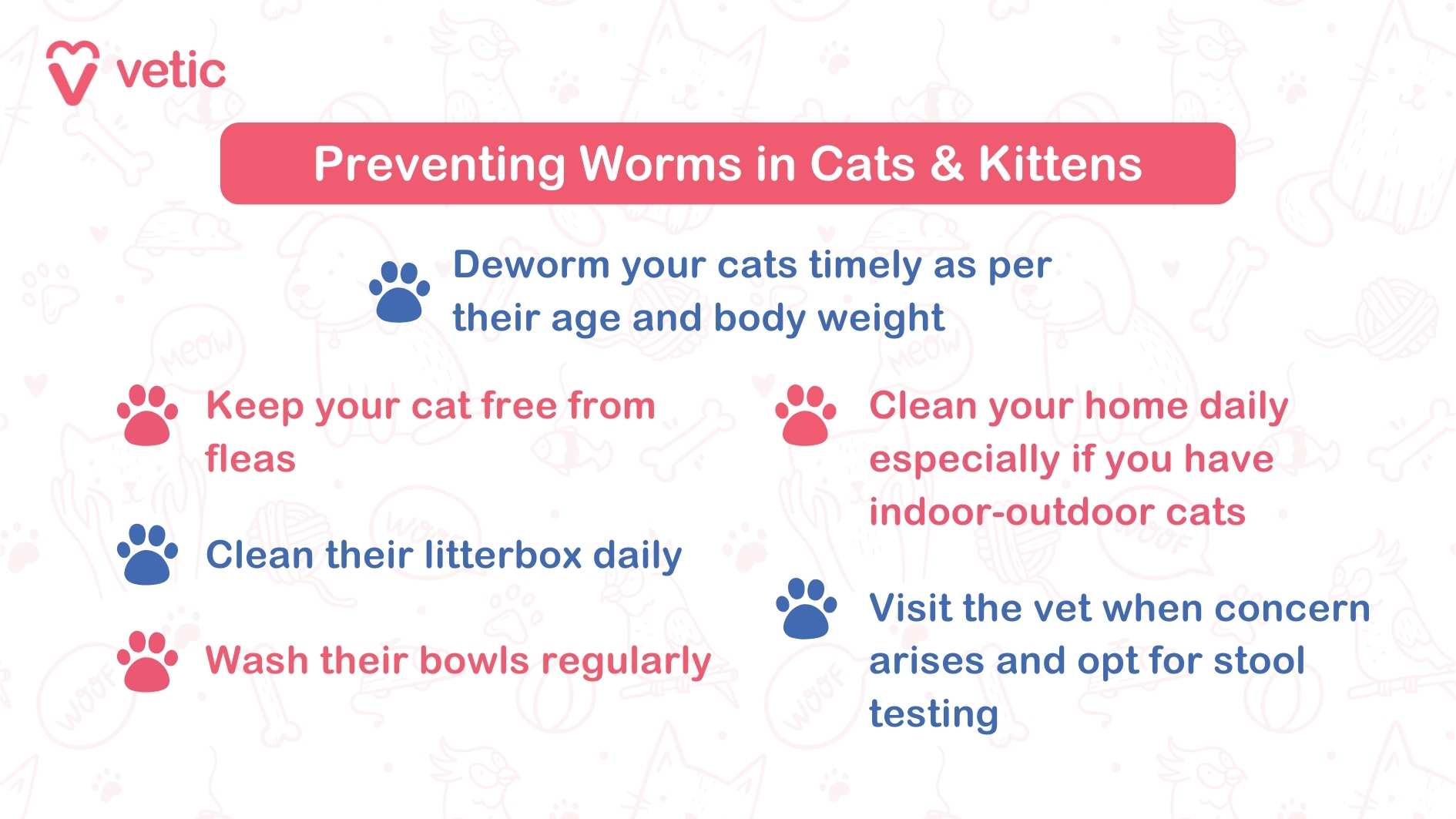
- Keep your cat and kitten free from fleas.
- Clean their litter box daily and wash their litter box frequently. Wash your hands afterwards.
- Wash their food and water bowls daily.
- Keep your home and litter box area clean. Use pet-friendly kennel cleaners for the same.
- Deworm your kitten and cat as per schedule, age and body weight.
- Take them to the vet regularly and complete recommended stool tests accordingly.
Why is deworming your cats and kittens a must?
It is an integral part of preventative healthcare in cats and kittens.
Zero or low worm load allows your kitten to receive proper nutrition and develop a healthy immune system.
It is an investment towards a long, happy and healthy life for your kitten.
However, dewormers only work when given at the correct dose. Contact a veterinarian near you to know the correct dose and find out if your kitten or cat is ready to receive their dewormer.
